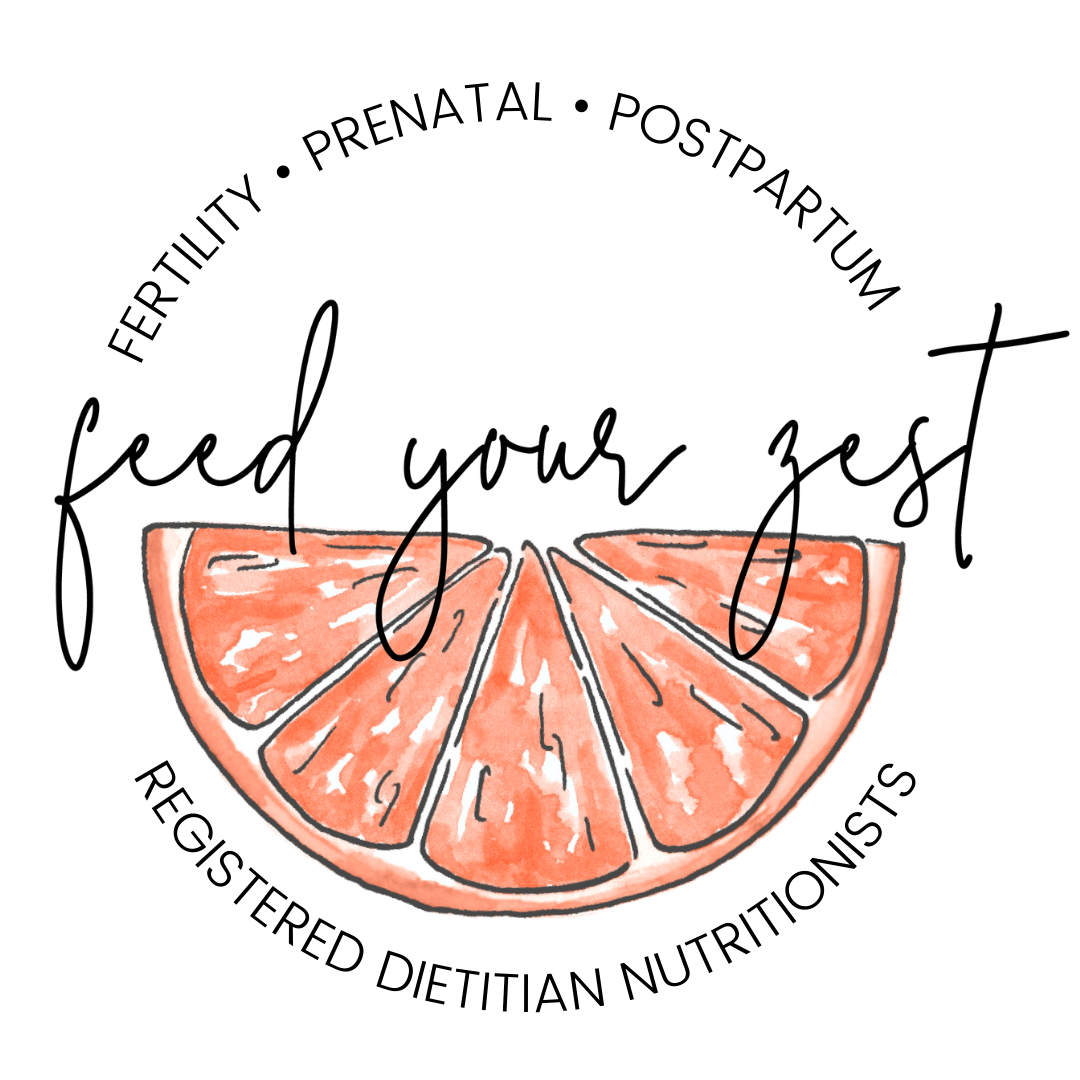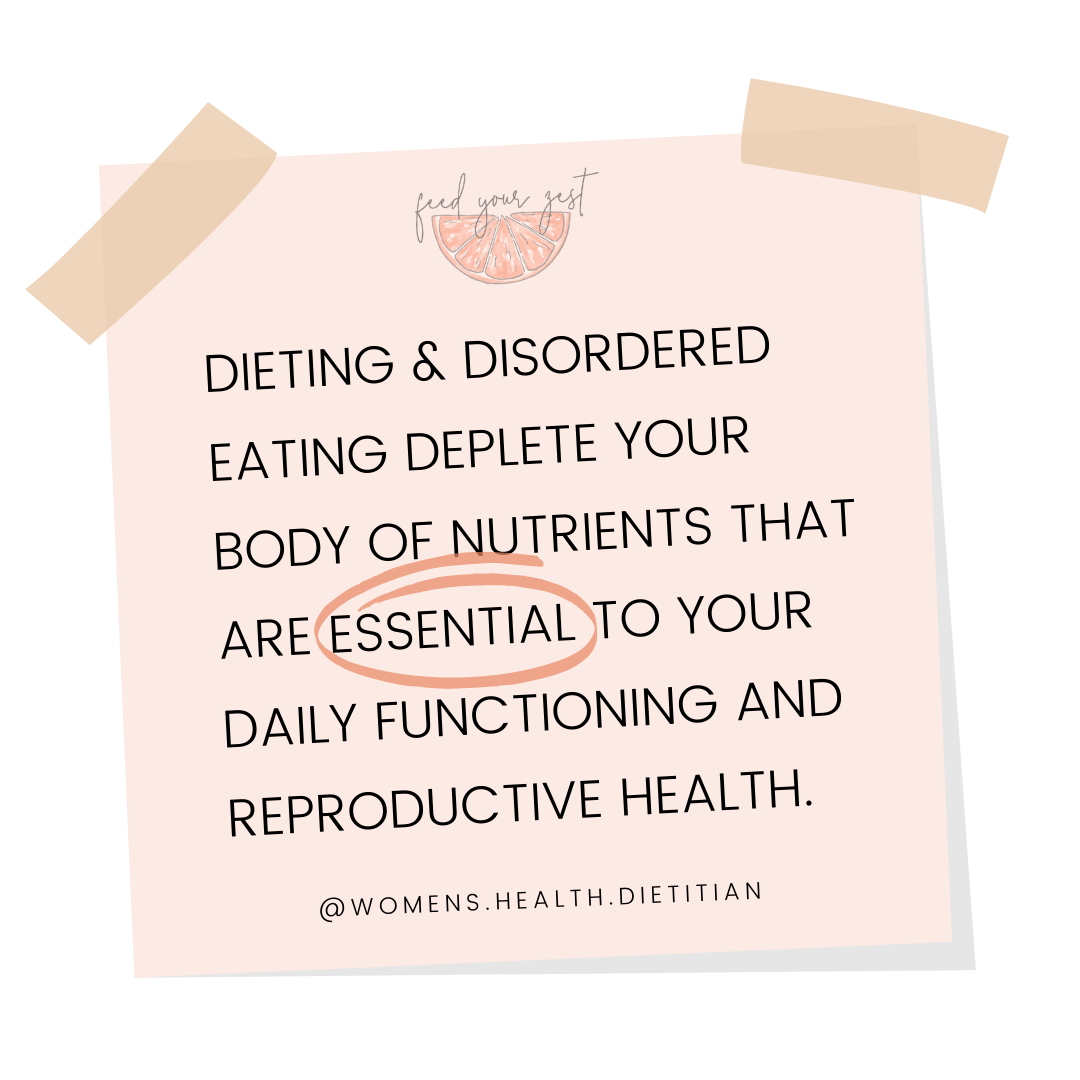4 Key Nutrients For Women’s Health That Your Diet May Be Missing
by Feed Your Zest intern Katie Parker, MS
Between the widespread misinformation about “healthy eating” and never-ending food rules from diet culture, it can be really hard to navigate how to have a healthful diet that supports your reproductive health. Here at Feed Your Zest, we are ready to listen and help you figure out what works best for your body. With that said, I’ve seen many clients that were affected by diet culture, which resulted in them cutting out entire food groups or food items. As a result, they experienced nutrient deficiencies and even fertility struggles.
We previously touched on the bare bones of what you need in order to have a well-rounded eating pattern and support fertility in this blog post. Today’s blog is going to go more in depth, by discussing some of the micronutrients that are beneficial for reproductive health. Micronutrient is just a fancy word which includes vitamins and minerals and means that our bodies require a lesser quantity -- but that doesn’t mean they aren’t important.
Calcium + vitamin D
It’s pretty well known that calcium is important for strong bones and teeth but that’s not the only reason we need it. Calcium is an essential mineral (meaning the body doesn’t make it but is needed to function) that helps our blood to clot, muscles to contract, and heart to pump. Women are at a higher risk for osteoporosis (loss of bone density), especially during stages of lower estrogen like during menopause or if you lose your period due to hypothalamic amenorrhea. This makes calcium intake that much more important. Because calcium is an essential mineral, if we don’t get enough through our diet it ends up being pulled from our bones. The good news is that there are many foods that have calcium in them like cow’s milk, cheese & yogurt, sardines, fortified soy milk & tofu, leafy greens, nuts and seeds.
Something to note is that vitamin D helps to absorb calcium, so pairing foods that contain both is even better than just eating calcium rich foods alone. Vitamin D is also important for mental health and your immune system. Vitamin D rich foods include fatty fish, mushrooms, red meats, liver, and egg yolks. People who may be at risk for calcium and vitamin D deficiency are those who follow a vegetarian or vegan diet, and those who don’t eat dairy. If you are someone who doesn’t eat many calcium and vitamin D rich foods, supplementing may be an option. Talk to your doctor or dietitian about the dose that’s right for you and be sure your supplement is either USP/NSF approved or third party tested since supplements aren’t regulated by the FDA.
Iron
The third micronutrient that’s important for reproductive health is iron. Iron’s main function is to transport oxygen throughout the body. Most of your body’s iron is found in hemoglobin of red blood cells and myoglobin of muscle cells. Iron is a nutrient McKenzie always tests for with her clients because iron deficiency is quite common among females because we lose it during our monthly periods, but that effect is compounded particularly in people who are restricting foods. Iron rich foods include sardines, red meats, poultry, oysters, spinach, legumes, pumpkin seeds and dark chocolate. It is important to note that your body will absorb animal sources of iron easily, but you can pair plant-based iron sources with vitamin C for proper absorption - this lentil veggies stew does exactly that! Using a cast iron skillet to cook is another great way to fortify your food with iron, and you can look at an iron supplement with your doctor or dietitian as well if you need to correct a deficiency. Having sufficient iron stores in your body is important not only for you to feel and function your best, but also because during pregnancy, iron is essential for your baby to grow and your stores can quickly become depleted.
Vitamin B12
Another nutrient that McKenzie tests for in all of her clients is vitamin B12. Vitamin B12 is required in the formation of red blood cells, helps with neurological function, and is needed for DNA synthesis. In other words, it’s extremely important for all bodily functions including your reproductive system. Having low vitamin B12 can lead to megaloblastic anemia if it’s not properly treated. A few signs of low vitamin B12 levels include weakness, fatigue, constipation, and loss of appetite. For pregnancy specifically, vitamin B12 is vital for neural tube formation, and brain and spine development in babies. Foods that are high in vitamin B12 are seafood, red meats, fortified breakfast cereals, and dairy products.
This list is of course not exhaustive as far as what micronutrients are important to consider for fertility and pregnancy, but as you can see, there are a wide variety of important micronutrients that can be easily missed by restricting food groups. Diet culture tries to sell you the pitch that being restrictive is best, when in reality being restrictive can wreak havoc on your body.
If you’re having fertility issues and are struggling with restricting foods, you may be a great fit for nutrition counseling with McKenzie! Click here to find out more.

